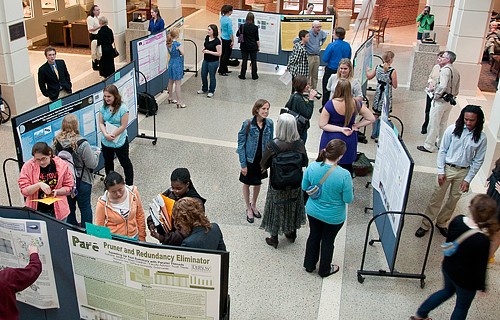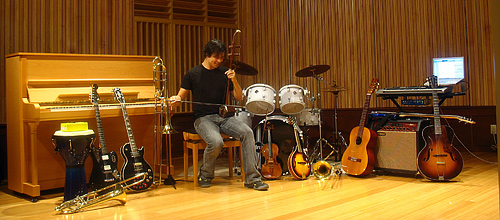2011 Senior Showcase
April 21, 2011

Want to know the best time of day to exercise? Or what zebrafish can tell us about nicotine dependence? These answers – and more – were found at the Senior Showcase, compliments of DePauw’s Class of 2011.
The Senior Showcase began in 2010 as a way for the University’s departments, schools and programs to show the best work of their senior students. Carrie F. Klaus, associate professor of modern languages and part-time assistant dean of academic life, helps to organize the showcase and its older sibling, the Academic Awards Convocation, which will be held later in the evening. Klaus says the event gives her and others a chance to step back and appreciate the full body of scholarship at DePauw.
“I think that we are often unaware of what’s going on outside our own departments,” Klaus says. “It’s a moment for our seniors to share their best work and for the University to express its pride in them and to celebrate their accomplishments here as they prepare for their lives after DePauw. The hope is that underclass students will also attend and be inspired to think about what they might achieve in the next few years at DePauw, and beyond.”
This year, 48 seniors presented 49 research projects, writings and performances at the Senior Showcase. The numbers don’t match up perfectly – thank senior Margaret “Maggie” B. Baber for that. She’s presenting two posters that together paint a picture of her four years at DePauw, both in and out of the classroom.
 Baber, a geosciences major and member of DePauw’s Science
Research Fellows Program (SRF), is presenting research she conducted last
summer while on her SRF internship at the University of New Hampshire.
Baber, a geosciences major and member of DePauw’s Science
Research Fellows Program (SRF), is presenting research she conducted last
summer while on her SRF internship at the University of New Hampshire.
Using temperature records from 40 weather stations across the northeastern United States, she looked at the number of extreme temperature days – days within the 99th percentile for seasonal temperature – during the last century. She says she adjusted the temperature ranges to account for differences across the region.
“You have to take into account that an extreme temperature in Pennsylvania is different from one in Maine,” Baber says.
Her research shows an upward shift during that period, with the frequency of extremely hot days increasing, while extremely cold days have diminished. Taken alone, one smoldering week in August means no more than a February blizzard, but a lopsided series of one or the other may suggest a changing climate.
“A common mistake people make when they look at climate data is that people tend to think on a really small scale,” Baber explains. “One week out of a winter is not climate; it’s weather. Climate is trends over decades, over centuries.”
Baber came to DePauw thinking that she would graduate with a degree in biology, but her academic interests changed as she became more involved with campus environmental groups. Her second poster at the Senior Showcase is a visual timeline of the history of the sustainability movement at DePauw, from early recycling efforts in the late 1990s, to more recent campus-wide competitions that have grown under the stewardship of Baber’s senior class.
She hopes the timeline shows students that they have been the driving force behind sustainability discourse and initiatives at DePauw – and how crucial students are to continuing that momentum.
“There will be a lot of students at the showcase, and a lot of people who are involved with sustainability on campus are leaving next year,” says Baber, who will enroll as a graduate student at Dartmouth University in the fall to study tropical glaciers. “I’m hoping that students who see this will think, ‘Oh, I really can make a difference here.’”
Not everything at the Senior Showcase fit on a poster, however. In fact, some students needed to be heard. Visitors also enjoyed readings by DePauw’s young writers and performances by students from the School of Music. Among them, senior music performance major Seth J. Tsui is definitely unique.
Tsui performed “Ghosts of Extinct Elephants,” the first of three movements in his North Africa Suite for Trombone and Electronics. The inspiration for the piece came from a classical studies paper Tsui (below) wrote about Carthage and the ancient city’s walking tank, the North African elephant.

“Hannibal used the North African elephant against Rome during the Punic Wars,” Tsui says. “It’s a kind of elephant that is larger than the Indian elephant, but smaller than the modern African elephant. They were easily trainable and heavily used by humans, and because of this, they went extinct by second century. They were one of first species of animals that mankind directly caused to go extinct. All the historical records we have of them are from the battles they were in. I thought their story was fascinating and tragic, so I decided to write a piece about them.”
Prokofiev would have approved of Tsui’s choice of trombone for music about elephants, but Tsui teases out the instrument’s true range of character throughout his suite’s three movements.
“The trombone is often used as the big fanfare, voice-of-God type of thing,” Tsui says. “At the same time, when played quietly, it can be a very beautiful, expressive instrument. I used those two sides of the instrument to express what I wanted to with the music.”
The second movement, “Papyrus Dreams,” is written in a way that can be played in either direction – a reference to the way papyrus, used by Egyptians as an early paper, can grow even upside-down. Tsui ends the suite with a direct response to the fall of Hosni Mubarak with a piece called “Toppling the Pharaohs.” The entire North Africa Suite can be heard online at http://sethtsui.bandcamp.com.
This summer, Tsui will continue to study the world through music. Thanks to a grant from the ASIANetwork-Freeman Foundation, he and Sherry J. Mou, associate professor of modern languages and Asian studies, will travel to inner-Mongolia to collaborate on a documentary about the region’s music.
Back in the U.S., Tsui has plenty of opportunities waiting for him. He has already booked recording sessions as a sound engineer following graduation, and he plans to tour with his band, Addictive Stranger. You might also catch him at the Indianapolis Symphony Orchestra, where he is a substitute trombonist.
Back